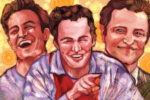“Arrested Development” is a series quite well-known for its recognizable cast and entertaining set-piece style of comedy. What is rarely done, though, is an analysis of why exactly this cast and style work in conjunction with one another. The show somehow manages to separate itself from other similar series like “The Office” while still maintaining many conventions and themes that define the genre. Though all of the technical aspects of “Arrested Development” are serviceable, it is able to accomplish all that it has primarily through the quality of its writing.
Much like “The Office,” “Arrested Development” is character-driven at its core, and much of its success can be attributed to the character writing in particular. The character given the most focus is Michael Bluth, who strangely shares the same first name as Michael Scott from “The Office.” While they may be called the same thing, they could not serve two more different functions in their respective shows. Michael Bluth plays the straight man, someone who is relatively normal and highlights the strangeness of the surrounding cast. Michael Scott, however, plays what might be known as the “absurd man,” whose purpose is to create comedic scenes by contrasting their eccentricity against more normal characters.
To understand this dynamic better, it helps to paint a clearer picture of the two Michaels in the context of their shows’ characters. Much of Michael Scott’s comedy stems from the interactions he has with characters like Pam, Jim or Jan, who are specifically constructed to be as average as possible. Not only does their ordinariness help the audience put themselves in the scene, it also makes evident exactly how weird Michael Scott’s actions are. There’s a reason why Jim is so commonly used for memes throughout the internet; it’s because his very normal reaction to someone behaving erratically is fundamentally relatable. This relatability is inherent in the construction of the characters in “The Office.” Each either acts as a point of relatability or takes advantage of the relatability of other characters to make their own behavior seem more extreme. Simply put, the off-key personalities of Michael Scott or Dwight would simply fail to be comedic without the normalcy Jim or Pam offer.
The writing in “Arrested Development” uses exactly these tactics in manufacturing its comedy, but takes the inverse of the approach of “The Office.” Rather than the main focus being on a strange character contrasted against a very normal backdrop, the comedy arises from a normal character contrasted against a very strange backdrop. Michael Bluth is a relatively normal business executive who must constantly deal with the antics of his bizarre family. Again, the majority of the memes from “Arrested Development” are of Michael Bluth reacting to something ridiculous a member of his family did. He is the person any member of the audience can relate to, and therefore he makes the comedy inherent to the situations presented possible.
Both of these comedic strategies have their advantages and disadvantages. One advantage of the comedy in “The Office” is that it is very portable; Michael Scott can travel anywhere and the comedic tone of the show goes with him. A great example of this is when he gets a job as a telemarketer and comes into contact with a number of fairly normal people. Because the show’s comedy stems from Michael Scott’s weirdness juxtaposed against normalcy, the scenes portraying his strangeness still work, even though the newly introduced characters are hardly developed and rather boring.
“Arrested Development” simply cannot afford to move Michael Bluth around to such an extent. His involvement in scenes is only entertaining when his pedestrian nature is contrasted with absurd characters, and the world would cease to feel realistic if he were to stumble upon these characters wherever he happened to go. If Michael Bluth were to interact with a lot of new characters, they would have to be mostly normal, and there is little comedy to be found in normal people interacting with other normal people.
However, the comedy of a normal person surrounded by absurd people is much more comedically consistent than the inverse. There are so many more opportunities for hilarious scenes when there are more far-out characters given screen time. The big problem with having one absurd character in a normal environment is that, comedically speaking, those normal characters can be distilled into one set of reactions. They simply aren’t as interesting as the absurd characters, and so having a few absurd characters in a sea of normal ones condemns the comedy to be a fairly one-note production. The writers of “The Office” recognize this, and over the course of its run, the initially normal characters like Angela or Oscar are given more strange qualities. This allows the humor to be more dynamic and to ultimately lean away from the fundamental shortcomings of the “few absurd character” approach.
The true strengths of both “The Office” and “Arrested Development” are in their characters, and therefore their writing. There should be absolutely no surprise that Michael Scott and Michael Bluth have become mainstays in internet culture for years; they are both remarkably memorable and hilarious to watch. But the techniques the writers employ to get them there could not be more different. Knowing the shortfalls of their strategies, both groups of writers eventually incorporate some kind of compromise between the two approaches. Still, the inner workings of both shows demonstrate their respective understandings of chemistry between characters, and that is why they are more comedically exceptional than most.

















